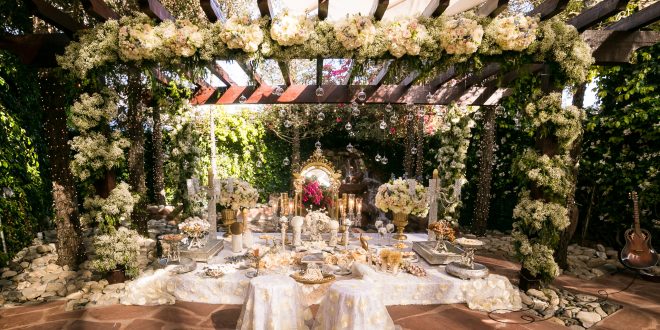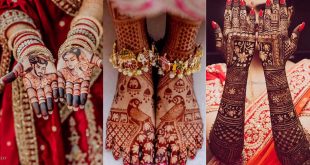Choosing the perfect wedding venue is a pivotal decision that sets the stage for your big day. It’s more than just a location; it’s where memories are made and dreams come to fruition. In India, where weddings are grand celebrations of love, tradition, and family, selecting the right venue becomes even more critical. The search for affordable wedding venues, luxury wedding venues, or unique wedding venues can seem daunting, but it’s also an exciting journey towards finding a place that reflects your style, honors your traditions, and accommodates your guests comfortably.
This article will guide you through several vital considerations before saying “yes” to your wedding venue. From setting a budget that aligns with affordable wedding venues to prioritizing what matters most to you, asking the right questions to understand wedding venue services, considering guest experience, and exploring the nuances of food and catering options. We will also delve into the importance of checking available dates for booking your dream venue, as well as the logistics of parking and transportation for your guests. With a thoughtful wedding venue checklist in hand, you’ll be equipped to make an informed decision that will lay the foundation for the wedding of your dreams.
Set Your Budget First

Before diving into the specifics of your dream wedding, establishing a clear and realistic budget is crucial. In India, where weddings often embody grandeur and tradition, managing finances effectively ensures your celebration aligns with both your dreams and your financial reality.
Understanding Your Financial Resources
Begin by assessing all available financial resources. This includes savings in bank accounts, investments, and other assets that could contribute to your wedding fund. It’s also wise to consider potential contributions from family and friends, ensuring you have a comprehensive understanding of the total funds available.
Creating a Detailed Budget Breakdown
Once you have a clear picture of your available funds, itemize potential expenses. Typical costs include venue hire, catering, décor, entertainment, and attire. Remember to account for often-overlooked details like transportation, gifts, and miscellaneous fees, which can accumulate unexpectedly.
Prioritizing Expenses
Every couple has unique priorities. Sit down with your partner to decide which aspects of your wedding are non-negotiable and which can be more flexible. This might mean allocating more funds towards a top-notch photographer while scaling back on other elements like floral arrangements.
Planning for the Unexpected
Allocate approximately 5% of your budget for unforeseen expenses. Unexpected costs can arise, and having a buffer will help you manage these without stress.
Monitoring Your Spending
Track your expenditures against your budget regularly. Tools like spreadsheets can be particularly helpful, allowing you to update and review your financial status continuously. This practice helps prevent overspending and ensures you stay on track.
By setting your budget first, you lay a solid financial foundation for your wedding planning. This organized approach not only helps in managing expenses but also in making informed decisions that enhance your celebration without compromising financial security.
Define Your Priorities
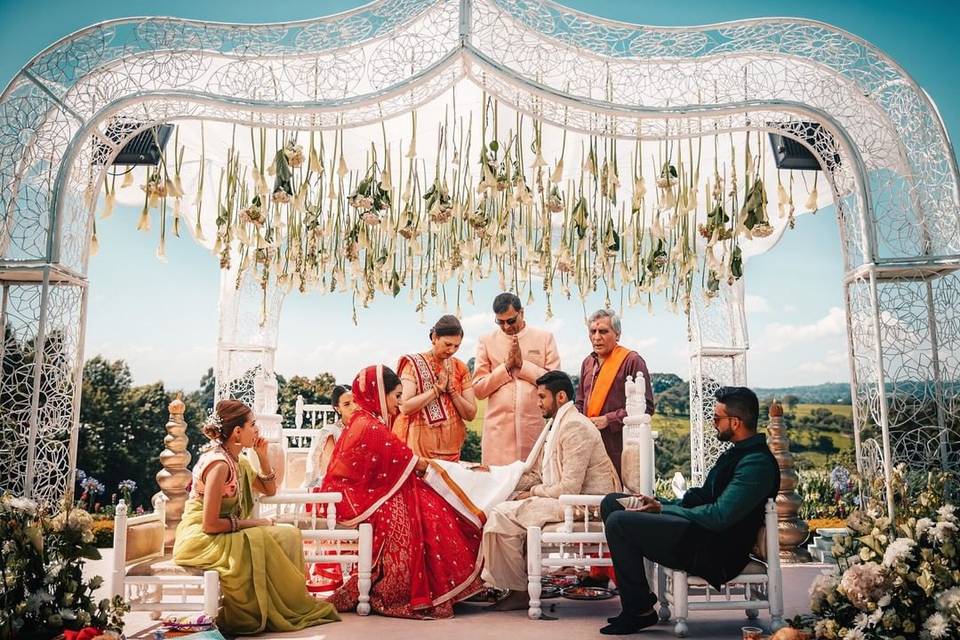
When planning a wedding in India, defining your priorities early in the venue selection process is crucial. This ensures that the venue aligns perfectly with both your vision and practical needs. Here’s how to set these priorities effectively:
- Wedding Style and Aesthetics: Determine the desired ambiance and theme of your wedding. Whether you envision a traditional, romantic, or modern setting, understanding your style will guide your venue selection. This aesthetic decision impacts everything from the decor to the type of ceremonies you can host.
- Guest Considerations: Knowing your guest count is essential. Venues vary in capacity, and it’s important to choose one that accommodates everyone comfortably without feeling overcrowded or too sparse. Consider the needs of your guests, including accessibility for elderly relatives or those with special needs.
- Season and Date: The time of year you wish to marry affects venue availability and pricing. In India, certain months are more popular and thus more expensive. Decide on a season that suits your style and check multiple dates to increase your chances of securing the ideal venue.
- Budget Management: Align your venue options with your financial resources. This involves not only the cost of the venue but also additional expenses like decor and catering. Prioritize spending based on what aspects of the venue are most important to you and your partner.
- Location and Accessibility: The venue’s location contributes significantly to the guest experience. It should be easily accessible for guests, especially if many are traveling from out of town. Check for nearby accommodations and transport links.
- Special Requirements: List any special features you require, such as a bridal suite, outdoor reception space, or specific catering policies. Remember, some venues offer complete packages that might include these elements, potentially saving time and money.
By focusing on these priorities, couples can ensure they choose a wedding venue that not only meets their aesthetic and emotional expectations but also handles practical considerations smoothly. This structured approach helps streamline the venue selection process, making it less overwhelming and more enjoyable.
Consider the Guest Experience
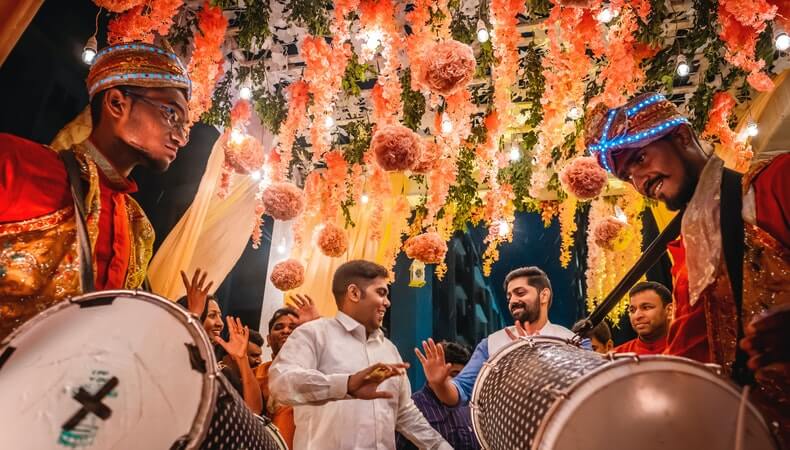
Your wedding day is not only a celebration of your union but also an opportunity to create an unforgettable experience for your cherished guests. In India, where weddings are significant events, ensuring that every guest feels welcomed and valued is crucial. Here are some thoughtful ways to enhance the guest experience at your wedding:
Warm Welcomes and Comfortable Settings
From the moment guests arrive, they should feel embraced and appreciated. Consider having a dedicated team of ushers or greeters at the venue entrance, offering warm welcomes and guiding guests to their seats. Thoughtful seating arrangements are essential; they not only provide comfort but also foster engaging conversations among guests. Incorporate personalized touches that resonate with your relationship, making the environment inviting and memorable.
Attention to Detail in Logistics
A well-organized event allows guests to immerse themselves fully in the celebration. Ensure clear directions are provided, along with comfortable accommodations if needed. For weddings spanning different locations, arranging shuttle services can minimize confusion and enhance convenience, ensuring everyone arrives on time and reducing parking hassles.
Exceptional Dining Experiences
Food plays a pivotal role in any wedding. Offer a diverse menu that caters to various dietary preferences and restrictions, ensuring every guest enjoys a delightful meal. Consider interactive food stations or themed bars that reflect your personal tastes, adding an element of fun and customization to the dining experience.
Engaging Entertainment Options
Curate entertainment that caters to the diverse tastes of your guests. This might include live bands, traditional dance performances, or even a DJ with a playlist that includes a mix of genres. For an added touch of uniqueness, incorporate performances like aerialists or local cultural acts that highlight the rich heritage of India, ensuring the entertainment resonates with all attendees.
Thoughtful Timing and Program Management
Plan your event’s schedule to maintain a lively pace and keep guests engaged. Space out speeches and performances appropriately to avoid any feeling of drag. Additionally, consider the overall duration of the ceremony, especially if it’s outdoors and subject to weather conditions. Providing amenities like handheld fans or refreshments can make a considerable difference in guest comfort.
By prioritizing these aspects, you can ensure that your wedding is not only a celebration of your love but also a joyous and comfortable experience for all your guests. These thoughtful considerations will contribute significantly to making your special day memorable for everyone involved.
Available Dates and Booking

When planning a wedding in India, securing the right dates for your venue is as crucial as selecting the venue itself. The process of booking a wedding venue involves several important steps and considerations that can significantly impact the overall planning and execution of your special day.
Understanding Venue Availability
The first step is to confirm the availability of your desired venue on your target dates. In India, where weddings are elaborate events, popular venues are often booked well in advance, especially during peak wedding seasons from May to October. It’s advisable to start your venue search at least a year in advance to ensure you have a wider selection of dates and venues. This early start also allows you to align your dates with other critical wedding arrangements, such as catering and decoration services.
Flexibility with Dates
Flexibility can play a key role in the booking process. Some couples choose a wedding date first and then look for venues available on that date. Others select their dream venue first and then choose from the available dates. The latter approach often provides more options in terms of venue selection. If your preferred venue is not available on your initial choice of date, consider alternative dates, including weekdays or off-peak seasons, which can also be more cost-effective.
Booking Process
Once you have decided on a venue and a date, the next step is to understand the booking process. Many venues in India offer online booking options, which can be convenient for checking availability and making reservations. However, visiting the venue in person is highly recommended. This not only allows you to get a feel of the place but also to discuss important details such as setup and take-down times, restrictions, and any specific requirements you might have.
Multiple Events and Venue Policies
Indian weddings often involve multiple events, and it’s important to clarify whether the venue can accommodate all these events on different dates or at different locations within the venue. Ask about the number of weddings hosted per day or weekend to ensure that your event receives the attention and exclusivity it deserves. Understanding these aspects will help you plan the sequence of events smoothly and avoid any last-minute surprises.
By carefully considering these factors and planning ahead, couples can ensure that their wedding venue not only meets their aesthetic and emotional expectations but also accommodates their guests comfortably, making their special day truly memorable.
Food and Catering Options
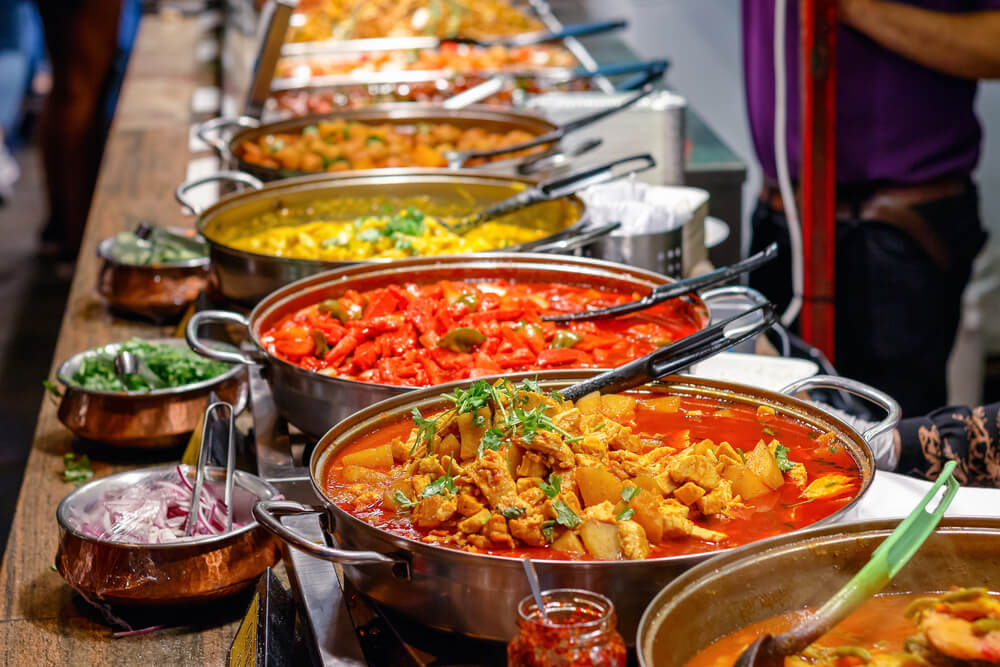
Food is often a highlight at weddings, playing a significant role in the overall guest experience. When planning a wedding in India, couples have a variety of catering styles to choose from, each offering a unique way to celebrate their special day. Understanding these options is crucial in creating an unforgettable culinary experience for guests.
Choosing the Right Service Style
The service style of the wedding meal can greatly influence the ambiance of the event. Couples should consider their venue, wedding style, and budget when deciding how food will be served:
- Sit-Down Wedding Dinners: This traditional option involves guests selecting their meal choices in advance, which are then served by a professional waitstaff. It’s suitable for formal weddings and helps in managing portion control and dietary accommodations.
- Buffet Style: Offering a variety of dishes laid out for guests to serve themselves, buffets encourage a more casual dining atmosphere and easier accommodation of dietary restrictions.
- Family-Style Meals: Large platters of food are shared at each table, creating a warm, communal dining experience. This style is perfect for couples who want a homey feel to their wedding meal.
- Food Stations: Similar to buffets, food stations offer a diverse range of foods but are more interactive, often requiring more staff to manage.
- Cocktail-Style Receptions: For a less traditional and more dynamic dining experience, couples might opt for a cocktail-style reception, focusing on hors d’oeuvres and drinks, which allows for more social interaction among guests.
Menu Considerations
Deciding what food to serve at a wedding is a personal choice but should also take into account the preferences and dietary needs of the guests. Here are some factors to consider:
- Guest Preferences: Offering a menu that includes a variety of dishes ensures that all guests find something enjoyable to eat, respecting common dietary restrictions and allergies.
- Seasonality and Theme: Incorporating seasonal and local ingredients not only enhances the flavor of the dishes but also ties the meal to the wedding’s locale and theme, adding a special touch to the celebration.
- Presentation and Flow: The chosen style of service will impact the layout of the reception space and the flow of the evening. It’s important to plan how the food will be presented and served to ensure a smooth experience for guests.
Tasting and Finalizing the Menu
Before finalizing the menu, couples should arrange a tasting with their caterer to ensure the food meets their expectations. This is also an opportunity to discuss any last-minute adjustments and confirm details such as portion sizes and presentation.
By carefully selecting the catering style and menu, couples can ensure that their wedding not only delights their guests with delicious food but also seamlessly blends with the overall ambiance and theme of their celebration. This thoughtful approach to wedding catering will contribute to a memorable and joyous occasion for everyone involved.
Parking and Transportation
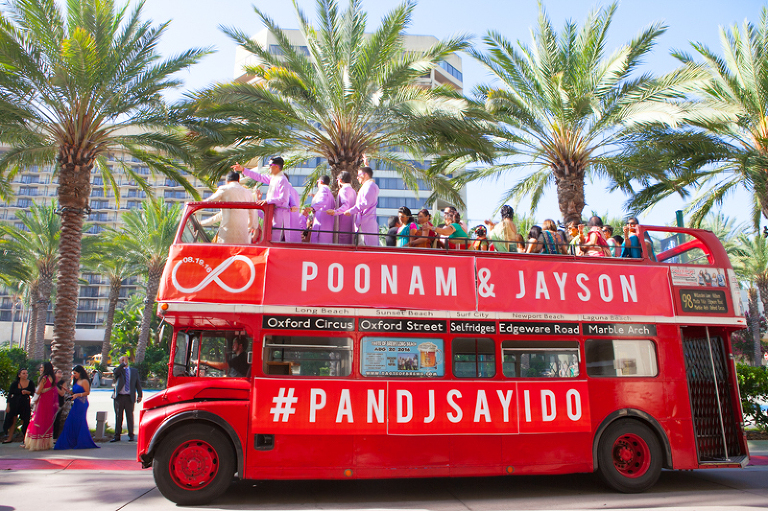
Ensuring seamless parking and transportation logistics is crucial for the smooth execution of your wedding day in India. This not only enhances the guest experience but also ensures that all events associated with your wedding proceed on time and without inconvenience.
Assessing Venue Parking Capacity
Firstly, it is vital to understand the parking facilities at your chosen venue. Determine if the venue offers on-site parking and the number of vehicles it can accommodate. This is particularly important if you have a large number of local guests who might prefer to drive to the venue. Additionally, check if there are designated areas for VIP and handicapped parking, which are essential for accommodating special guests and those with mobility issues.
Transportation for Guests and Wedding Party
For guests traveling from out of town or if the wedding venues (ceremony, reception) are spread across different locations, consider arranging dedicated transportation. Options like shuttles or buses can ferry guests between venues, ensuring everyone arrives safely and on time. This is especially helpful in areas where public transport or rideshare options are limited. For the wedding party, hiring a limousine or a party bus can add a touch of luxury and convenience, allowing the group to travel together and stay on schedule.
Vendor Transportation Needs
Do not overlook the transportation needs of your vendors. From photographers to caterers and decorators, ensure they have the necessary parking space for easy loading and unloading of equipment. This smooth coordination helps in preventing any delays or disruptions in the setup of your wedding.
Alternative and Fun Transportation Options
If you’re looking to add a unique touch to your wedding, consider quirky transport options like a decorated vintage bus or even a ferry ride if your venue is near a water body. These choices not only make for memorable experiences but also serve as delightful backdrops for photographs.
Planning and Communication
Ensure that all transportation plans are well-documented and communicated to all parties involved. From guests to vendors, everyone should be aware of the transportation arrangements. Include detailed information in your wedding invitations or a dedicated wedding website. Also, consider having coordinators or signage at the venue to assist guests and manage the flow of vehicles.
By meticulously planning the parking and transportation for your wedding, you can avoid last-minute chaos and ensure that your guests have a pleasant and stress-free experience. This thoughtful arrangement allows everyone to enjoy the festivities without worrying about how to navigate between different venues or find parking spaces.
Conclusion
Embarking on the journey to select the perfect wedding venue in India is both a monumental and intimate decision for couples. It marks the beginning of a shared future, nestled within the vibrant tapestry of Indian traditions, culture, and familial bonds. Through the comprehensive exploration of budgeting, prioritizing needs, enhancing guest experiences, and understanding logistical essentials like dates, catering, and transportation, this article has aimed to equip couples with the knowledge needed to make informed, heartwarming decisions. Reflecting on these considerations ensures the chosen venue resonates not only with the couple’s aesthetic preferences but also upholds the sanctity and joy of Indian matrimonial celebrations.
As we conclude, remember that the essence of your wedding day is a reflection of your shared dreams and the love that binds you. Let your chosen venue be the backdrop against which your story unfolds, amid laughter, joy, and the coming together of dear ones. To ensure every detail of your day is as perfect as envisioned and to explore comprehensive solutions tailored specifically for Indian weddings, feel welcome to contact us at weddings.venuelook.com. By embracing the wisdom shared within these considerations and seeking expert guidance, your wedding venue selection will not just meet expectations but exceed them, making your special day truly unforgettable.
FAQs
1. How can you determine if a wedding venue suits your needs? When selecting the ideal wedding venue, consider the following steps: Start by setting a budget, decide whether you prioritize the venue or the date, use a comparison chart to evaluate different venues, identify your preferred style, read reviews, check for any vendor restrictions, consider guests traveling from afar, and find out the venue’s curfew.
2. What are the top five factors to consider when choosing a wedding venue? When choosing a wedding venue, keep these five key considerations in mind: the size of the venue should accommodate your guest list, the location should be convenient and possibly offer accommodations, assess the quality of staff and available amenities, consider the décor and thematic details, and look for good photo opportunities.
3. Why is the choice of wedding venue critical? The choice of your wedding venue is crucial as it significantly influences the overall ambiance of your wedding and reception. It not only sets the tone but also leaves a memorable impression on your guests.
4. Is it necessary to arrive early to a wedding? Yes, it is advisable for guests to arrive about 30 minutes before the ceremony’s scheduled start time. This is especially important for weddings with large guest lists, as it allows extra time for seating and any unforeseen delays.
To find the right wedding vendors, visit venuelook.com/vendors.
For A-Z of wedding planning and decorations, contact us at weddings.venuelook.com.
You May Also Like:
- Affordable Yet Elegant Wedding Venues: Achieving the Dream Nuptials on a Budget
- Intimate vs. Grand: Finding the Perfect Size for Your Wedding Venue
- Reasons Why Should Brides RENT Their Lehengas?
- Amazing Tips To Create The Perfect Wedding Favours!
- Best Cocktail Party Ideas
- Cocktail Party Hosting Tips, Food and Drinks Menu Ideas
- Cocktail Party Ideas
- 10 Easy to mix Cocktail Recipes for Parties
- Cocktail Ideas for Dinner Parties
Have you sent out invitations for your upcoming event? If not, save paper and send free online invitations now.

Looking for a party venue? Browse and book best-suited party venues from VenueLook.com
 Event, Party & Wedding Planning Tips & Ideas for Celebrations Party and Event Planning Tips, Resources and Venues
Event, Party & Wedding Planning Tips & Ideas for Celebrations Party and Event Planning Tips, Resources and Venues
